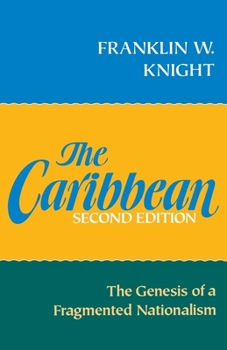The Caribbean: The Genesis of a Fragmented Nationalism
Select Format
Select Condition 
Book Overview
Offering a rare pan-Caribbean perspective on a region that has moved from the very center of the western world to its periphery, The Caribbean journeys through five centuries of economic and social development, emphasizing such topics as the slave-run plantation economy, the changes in political control over the centuries, the impact of the United States, and the effects of Castro's Cuban revolution on the area. The newly revised Second Edition clarifies...
Format:Paperback
Language:English
ISBN:0195054415
ISBN13:9780195054415
Release Date:October 1990
Publisher:Oxford University Press
Length:416 Pages
Weight:1.06 lbs.
Dimensions:0.9" x 5.5" x 8.5"
Customer Reviews
4 ratings
Great window on a harsh, beautiful past
Published by Thriftbooks.com User , 15 years ago
Knight writes like a good sociologist. His focus is signal events and social change, always well explained, with quantitative measures of scope and impact. The book is island focused -- with little attention on the Caribbean's mainland enclaves of Belize, the Guyanas, or Suriname. But it gives a good foundation for understanding the diverging paths of numerous island states. It gives a feel for the impact of anti-plantation attitudes after the Haitian revolution, the repressive terror which that revolution unleashed in planters and colonial governors across the Caribbean, the rise of community and labor organization, the diverse forms of post-colonial rule, and the difficult trials of many economic models. Though the survey ends around 1990, it's a great window on everything that came before.
Great window on a harsh, beautiful past
Published by Thriftbooks.com User , 15 years ago
Knight writes a good sociologist. He doesn't really tell human interest stories of slave revolts, buccaneers, labor leaders, etc. His focus is signal events and social change, always well explained, with quantitative measures of scope and impact. The book is island focused -- with little attention on the Caribbean's mainland enclaves of Belize, the Guyanas, or Suriname. But it gives a good foundation for understanding the diverging paths of numerous island states. It gives a feel for the impact of anti-plantation attitudes after the Haitian revolution, the repressive terror which that revolution unleashed in planters and colonial governors across the Caribbean, the rise of community and labor organization, the diverse forms of post-colonial rule, and the difficult trials of many economic models. Though the survey ends around 1990, it's a great window on everything that came before.
Great window on a harsh, beautiful past
Published by Thriftbooks.com User , 15 years ago
Knight writes like a good sociologist. He doesn't really tell human interest stories of slave revolts, buccaneers, labor leaders, etc. His focus is signal events and social change, always well explained, with quantitative measures of scope and impact. The book is island focused -- with little attention on the Caribbean's mainland enclaves of Belize, the Guyanas, or Suriname. But it gives a good foundation for understanding the diverging paths of numerous island states. It gives a feel for the impact of anti-plantation attitudes after the Haitian revolution, the repressive terror which that revolution unleashed in planters and colonial governors across the Caribbean, the rise of community and labor organization, the diverse forms of post-colonial rule, and the difficult trials of many economic models. Though the survey ends around 1990, it's a great window on everything that came before.
Solid In-depth Study of Caribbean
Published by Thriftbooks.com User , 17 years ago
Most are familiar with the Caribbean as a desired vacation destination. Others think of it as a place notoriously known for pirates and buccaneers. It's a diverse region comprising of Europeans, Indians, Africans, East-Indians, and Chinese, yet within the archipelago of islands, languages, and culture, it's a region unified with a common historical legacy. This is the thesis to Franklin Knight's book. Studying Caribbean history offers tremendous insights into the ways of old world imperialisation. After all, this is where the new world experiment began and where the European powers acquired much of their wealth. Also, the end of global slavery began with dealing with the moral and economic questions of Caribbean slavery. Knight takes you on an explanatory journey on the history of the region, from Columbus, to the Native Indians, to European migration, to plantation structure, to the Haitian revolution, to eventually the emergence of Caribbean nation-states. Knight is exceedingly thorough although his writing style can be a bit recondite so it takes a certain degree of concentration to trudge through his work. Also, Knight's narrative is from the `local perspective', where he doesn't treat the region's history as the act of a play, but as the play itself. He states this early and initially you applaud his commitment to keeping the Caribbean's story center-stage. The only problem with this is that the region was in fact an outpost of European metropolitan society so some events appear translucent without completely understanding what was unfolding behind the scenes on the continent. This work is not an easy read but it's very well researched, meticulous and comprehensive.






